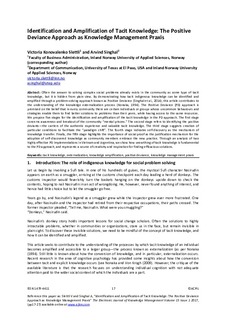Identification and Amplification of Tacit Knowledge: The Positive Deviance Approach as Knowledge Management Praxis
Journal article, Peer reviewed
Published version
Permanent lenke
http://hdl.handle.net/11250/2484335Utgivelsesdato
2017Metadata
Vis full innførselSamlinger
Originalversjon
Electronic Journal of Knowledge Management. 2017, 15 (1), 48-58.Sammendrag
Often the answer to solving complex social problems already exists in the community as some type of tacit knowledge, but it is hidden from plain view. By demonstrating how tacit indigenous knowledge can be identified and amplified through a problem-solving approach known as Positive Deviance (Singhal et al., 2014), this article contributes to the understanding of the knowledge externalization process (Nonaka, 1994). The Positive Deviance (PD) approach is premised on the belief that in every community there are certain individuals or groups whose uncommon behaviours and strategies enable them to find better solutions to problems than their peers, while having access to the same resources. We propose five stages for the identification and amplification of the tacit knowledge in the PD approach. The first stage concerns awareness and breakout of the community “mental prisons.” The second stage refers to identifying the positive deviants—the carriers of the authentic experience and valuable tacit knowledge. The third stage suggests creation of particular conditions to facilitate the “paradigm shift”. The fourth stage indicates self-discovery as the mechanism of knowledge transfer. Finally, the fifth stage highlights the importance of social proof as the justification mechanism for the adoption of self-discovered knowledge as community members embrace the new practice. Through an analysis of two highly effective PD implementations in Vietnam and Argentina, we show how unearthing of tacit knowledge is fundamental to the PD approach, and represents a source of creativity and inspiration for finding efficacious solutions.
Tidsskrift
Electronic Journal of Knowledge Management
Med mindre annet er angitt, så er denne innførselen lisensiert som Attribution-NonCommercial-NoDerivatives 4.0 Internasjonal
Beslektede innførsler
Viser innførsler beslektet ved tittel, forfatter og emneord.
-
Whistleblowing and Mindful Organizing in High-Risk Organizations
Bakken, Bjørn T.; Hole, Åse Storhaug; Haugen, Anne Oline; Lund, Per Olav (Chapter, 2019) -
Fugitive Futures and Knowledge Brokering: Adding Value, Habits, and Trust in Early Childhood Education and Educational Research
Reinertsen, Anne Beate; Ulla, Bente; Larsen, Ann Sofi; Moxnes, Anna Rigmor; Aslanian, Teresa Katherine; Andersen, Camilla Eline (Peer reviewed; Journal article, 2022)This article is a collective act of writing preoccupied with the future of education. Our perspectives are different but what we have in common is a wish to explore and contribute to educational innovation. Through knowledge ... -
The Importance of Tacit and Explicit Knowledge Transfer in an Onboarding Programme
Haave, Hanne Marit; Vold, Aud Tone; Kaloudis, Aris (Peer reviewed; Journal article, 2020)Abstract: “Onboarding” is one way of facilitating training for newcomers to get them socialized and trained for the job in question. Getting newcomers “up to speed” and reducing turnover is cost saving for a company. In ...

